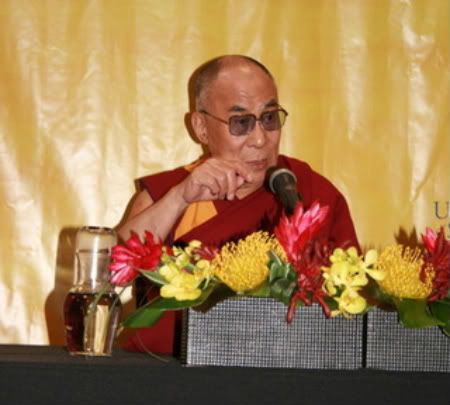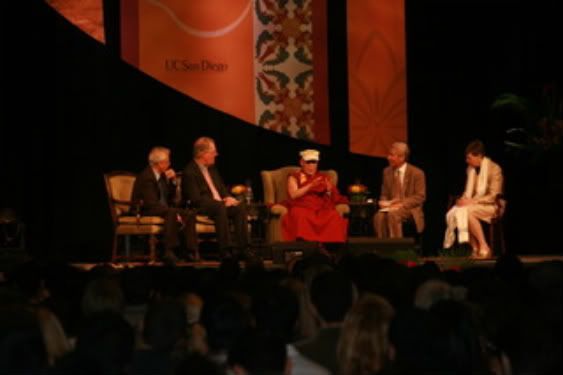"THE ONENESS OF HUMANITY": COMPASSION AND COOPERATION IN COMBATING CLIMATE CHANGE
 By Megha RamEditor-in-ChiefandDavid DanneckerStaff WriterHis Holiness the 14th Dalai Lama of Tibet opened his “Compassion without Borders” tour with a visit to UCSD on Wednesday, April 18, 2012 by encouraging “a sense of global responsibility” in addressing the challenges of climate change. He was joined by two panelists from the Scripps Institute of Oceanography, Dr. Richard Somerville and Dr. Veerabhadran Ramanathan, who provided scientific context based on their experience and research in the field of climate science. The panel’s discussion centered on the need for international collaboration, environmental awareness through education and the need to unite politicians, economists and the public behind scientific inquiry.Humanity as a whole shares a common home, and with it a common burden to protect the environment and preserve it for posterity. For much of history, the climate has changed due to natural causes, however in recent times human activities have grown to play an inordinately large role in causing climate change. As Dr. Somerville explained, “our generation today now controls what the climate will be for our children and grandchildren. We did not seek this power, but we have it because we have long used the atmosphere as a free dump for the side effects and waste products of human activities.” While all nations contribute to climate change, there is a lack of effective international cooperation to mitigate its effects.“This is a[n] issue of humanity, not of this nation or that nation. Each of our futures depends on the rest of humanity,” the Dalai Lama said. He continued to emphasize that friendship and cooperation can only be achieved through trust and mutual respect — essentially that “we need cooperation based on the clear realization of the oneness of humanity” in order to respond to the challenges of climate change.Through his advocacy for mutual respect and cooperation, the Dalai Lama hopes that humanity can better address common goals in the future by transcending nationalities. One of the ways the Dalai Lama hopes to achieve this goal is by instilling compassion and values into the modern education system. He recommends that educational institutions “should take care of brain development as well as the development of warm heartedness,” teaching both material values and internal values. The idea is that the motivation for social responsibility would not be tied to one’s religious beliefs, but rather that people would learn compassion, values and social responsibility in a neutral and secular setting. This secular education would encourage future generations to hold a more holistic and compassionate view of the world.Education must be accompanied by increased awareness in the many spheres of society. The general populace must accept the truth of climate change, and then inspire action by conveying its importance to the political and economic spheres of society. According to the Dalai Lama, the basis of understanding the causes and effects of climate change must be scientific evidence. He stated,“It is not a religious matter. Of course we can draw from the resources of religious tradition to further reinforce our commitment to this kind of responsibility, but for me what is more convincing is scientific explanation.”
By Megha RamEditor-in-ChiefandDavid DanneckerStaff WriterHis Holiness the 14th Dalai Lama of Tibet opened his “Compassion without Borders” tour with a visit to UCSD on Wednesday, April 18, 2012 by encouraging “a sense of global responsibility” in addressing the challenges of climate change. He was joined by two panelists from the Scripps Institute of Oceanography, Dr. Richard Somerville and Dr. Veerabhadran Ramanathan, who provided scientific context based on their experience and research in the field of climate science. The panel’s discussion centered on the need for international collaboration, environmental awareness through education and the need to unite politicians, economists and the public behind scientific inquiry.Humanity as a whole shares a common home, and with it a common burden to protect the environment and preserve it for posterity. For much of history, the climate has changed due to natural causes, however in recent times human activities have grown to play an inordinately large role in causing climate change. As Dr. Somerville explained, “our generation today now controls what the climate will be for our children and grandchildren. We did not seek this power, but we have it because we have long used the atmosphere as a free dump for the side effects and waste products of human activities.” While all nations contribute to climate change, there is a lack of effective international cooperation to mitigate its effects.“This is a[n] issue of humanity, not of this nation or that nation. Each of our futures depends on the rest of humanity,” the Dalai Lama said. He continued to emphasize that friendship and cooperation can only be achieved through trust and mutual respect — essentially that “we need cooperation based on the clear realization of the oneness of humanity” in order to respond to the challenges of climate change.Through his advocacy for mutual respect and cooperation, the Dalai Lama hopes that humanity can better address common goals in the future by transcending nationalities. One of the ways the Dalai Lama hopes to achieve this goal is by instilling compassion and values into the modern education system. He recommends that educational institutions “should take care of brain development as well as the development of warm heartedness,” teaching both material values and internal values. The idea is that the motivation for social responsibility would not be tied to one’s religious beliefs, but rather that people would learn compassion, values and social responsibility in a neutral and secular setting. This secular education would encourage future generations to hold a more holistic and compassionate view of the world.Education must be accompanied by increased awareness in the many spheres of society. The general populace must accept the truth of climate change, and then inspire action by conveying its importance to the political and economic spheres of society. According to the Dalai Lama, the basis of understanding the causes and effects of climate change must be scientific evidence. He stated,“It is not a religious matter. Of course we can draw from the resources of religious tradition to further reinforce our commitment to this kind of responsibility, but for me what is more convincing is scientific explanation.” Not only does science prove the inevitability of climate change in the future, but also that its effects are occurring much sooner than previously predicted. Dr. Ramanathan expands,“When we talk about climate change, we normally talk about what’s going to happen 100 years from now. So economists say, ‘do you want to take that benefit now or wait 100 years?’ But what we are finding is that climate change is happening now. We need to sensitize our economists [to the fact] that changes are happening now. Fact awareness would take this argument and help us work together.”Once these ideas have gained traction, the next step is to inspire action through policy. Dr. Somerville expounds on the importance of public engagement with the political sphere,“The political process has been so slow and ineffective in many ways in doing what needs to be done. I think [this is] because we have to educate our political leaders and tell them that this is important. When polling in this country, and many other countries, shows that the environment ranked very low compared to things like economic prosperity, national security and education, then we find that politicians can conveniently ignore it. So I ask people that take this issue seriously to tell their politicians that it is important to them. We have a democratic government and politicians react to pressure from voters.”Thus, science must be the basis for mitigating the problems associated with climate change, as it is the foundation of public awareness and effective policy-making. The Dalai Lama professed his genuine respect and admiration for science by praising the scientific inquiry that brings us new knowledge.“Scientists are very skeptical. Skepticism [is] very necessary, skeptical attitude brings questions, questions bring research, research can analyze our problems and analysis brings answers,” he said.
Not only does science prove the inevitability of climate change in the future, but also that its effects are occurring much sooner than previously predicted. Dr. Ramanathan expands,“When we talk about climate change, we normally talk about what’s going to happen 100 years from now. So economists say, ‘do you want to take that benefit now or wait 100 years?’ But what we are finding is that climate change is happening now. We need to sensitize our economists [to the fact] that changes are happening now. Fact awareness would take this argument and help us work together.”Once these ideas have gained traction, the next step is to inspire action through policy. Dr. Somerville expounds on the importance of public engagement with the political sphere,“The political process has been so slow and ineffective in many ways in doing what needs to be done. I think [this is] because we have to educate our political leaders and tell them that this is important. When polling in this country, and many other countries, shows that the environment ranked very low compared to things like economic prosperity, national security and education, then we find that politicians can conveniently ignore it. So I ask people that take this issue seriously to tell their politicians that it is important to them. We have a democratic government and politicians react to pressure from voters.”Thus, science must be the basis for mitigating the problems associated with climate change, as it is the foundation of public awareness and effective policy-making. The Dalai Lama professed his genuine respect and admiration for science by praising the scientific inquiry that brings us new knowledge.“Scientists are very skeptical. Skepticism [is] very necessary, skeptical attitude brings questions, questions bring research, research can analyze our problems and analysis brings answers,” he said. Once we are equipped with the knowledge that science provides about our reality, we must take it to heart. “We can’t say it is our sort of way of life. We have to think about reality — what benefit[s]? What harmfulness?” the Dalai Lama said. Essentially, we must think critically about our actions and align them with the reality of their effect on the environment.“This is a question of our life, our survival. Not only [of the] individual, [but of the] entire planet. If something really goes wrong, then the entire humanity and millions of species are lost. This blue, small planet is [our] only home. We have to take care of it,” the Dalai Lama said.Images Courtesy of David Dannecker
Once we are equipped with the knowledge that science provides about our reality, we must take it to heart. “We can’t say it is our sort of way of life. We have to think about reality — what benefit[s]? What harmfulness?” the Dalai Lama said. Essentially, we must think critically about our actions and align them with the reality of their effect on the environment.“This is a question of our life, our survival. Not only [of the] individual, [but of the] entire planet. If something really goes wrong, then the entire humanity and millions of species are lost. This blue, small planet is [our] only home. We have to take care of it,” the Dalai Lama said.Images Courtesy of David Dannecker